- Home
- F. Paul Wilson
Wardenclyffe Page 8
Wardenclyffe Read online
Page 8
Suddenly I wanted away from the water—needed to be away. So quiet, but the memory of that scream haunted me. The water…peaceful now…on the surface. But beneath…something in the depths had stirred.
My brain churned as I hurried away. Had the standing waves the tower generated in the Earth awakened something? But how would that be related to the disappearance of the barn? I could find no consistency, no pattern other than the operation of the tower. But if the tower were the cause, why then didn’t the fish flee the water every time we powered it up?
I spotted the bulb fixture ahead, still glowing. I snatched it from the ground and began to run back toward the tower…or rather where I thought it would be.
I passed through a particularly thick band of fog and when I broke free the ground had changed. Instead of level, it sloped upward, and the familiar scraggly weeds and scrub had changed to oddly shaped plants with undulating tendrils instead of leaves, and flowers that seemed to open and close like mouths.
I shook my head to clear it just as I entered another thickened fog band. When I broke free the vegetation had returned to the familiar, but I still couldn’t see the tower. It should have been straight ahead…at least I hoped it was.
What if the tower and plant were no longer there? What if they’d vanished and I was stranded in some strange, mysterious landscape. What if—?
Where were these thoughts coming from? This wasn’t like me. Before leaving England I’d read Machen’s wildly reviled The Great God Pan—precisely because it had been so vociferously denounced—and couldn’t help feeling how this inexplicable, daytime nightmare might have been pulled from its pages.
And then, ahead and slightly to the left, I saw flashes high in the fog—the tower’s cupola. The burst of relief annoyed me—no, angered me. I was a sane, rational man, trained in a logical science. Everything had an explanation. All one need do was gather the facts. The fantastic had no place in my life.
And yet, for a moment there, my disorientation in the fog had allowed my imagination to get the better of me. At least I hoped it had been my imagination.
When I reached the tower and the plant, I barely broke stride as I ran inside and turned off the generator. Tesla rushed out of his office.
“What are you doing? What is the meaning of this?”
Panting from the run, I turned to him and said, “We have to talk.”
* * *
I convinced them all—Tesla, Scherff, and Drexler—to gather in the office and hear me out. I told them about the second fish kill and the disappearing boat. And the scream. I left out the irrational fear that for a short while I’d been somewhere other than Wardenclyffe. The feeling had lasted only a moment.
I also related the gist of my conversations with Mr. Herring and Mrs. Williams. Drexler had already heard this, but it was news to Tesla and Scherff, and they seemed dumbfounded. Drexler, on the other hand, seemed excited.
He went to the window. “The fog’s lifting. If you fellows don’t mind, I’m going down to the water for a look.”
No one objected.
As Drexler pulled on his suit jacket and headed for the office door, I turned to Tesla: “What was it that woman said to you last year after the first fish kill? And please don’t dismiss it as ‘nonsense’ again, because we have another load of dead fish out there.”
He frowned. “What woman?”
“Surely you remember. The Gypsy woman who spoke to you in Serbian. The one with the dog.”
Drexler skidded to a stop in the doorway. “Dog? A woman with a dog? What did she say?”
“Some nonsense about a wall.”
“She mentioned a wall?” Drexler seemed to have forgotten about the dead fish. “You’re sure she said ‘wall’?”
Why is this so important to him? I wondered.
“Yes. She used the word zid—wall. She said, ‘You must stop what you are doing. You made a crack in the wall. If you keep it up the crack will become a hole.’ Obviously she is crazy. There was not a wall in sight.”
“She is most crazy,” Drexler said. “Verrückt!”
“You know her?” I said.
“I know of her. A meddlesome schlampe.”
I had no idea what that meant but it hardly sounded complimentary.
I said, “She was a random woman walking down the bloody beach. How could you possibly think it’s the same one you know?”
“Because that sounds exactly like something she would say. And she is never without a dog. Always a dog.”
“You seem…afraid of her,” I said.
“What? Nein. Not at all.” Pointing to each of us in turn, he said, “I am afraid for you and you and you!”
“She looked quite harmless,” Scherff said.
“She will not hurt your body.” He jabbed a finger against his temple. “She will hurt you here. Poison your mind.”
He looked a little mad at that moment. And he feared her, of that I had no doubt.
“Poison against what?” I said.
“Changing the world! Some people do not want change. They want everything like it always was. If you see her again, avoid her. Do not listen.” The finger against his skull again. “Poison!” He stepped back toward the door. “And now I go to see the dead fish.”
The three of us stood silent for a moment after he’d gone. Finally I turned to Tesla and arched an eyebrow.
“I do believe you upset him.”
My understatement was lost on him. “I am not concerned with Mister Drexler’s upsetment. I am upset. I believe we all should be upset. We have unexplained phenomena we must deal with.”
“We can deal with them some other time,” Scherff said. “The important thing we seem to be losing sight of is that the experiment was a success! The bulb lit when we stuck it into the ground. It is a miracle!”
“A ‘miracle’?” Tesla gave him a withering look. “It is nothing of the sort. It is simply more experimental proof of my theories. I already did this in Colorado Springs.” He looked from Scherff to me, pain in his eyes. I could see that this man, who eschewed emotion in everything he did, felt hurt, betrayed by his closest associates. “The two of you—did you think I made it up?”
“No-no,” Scherff said. “It’s just that…” He looked to me for help, a plea in his eyes.
“Nothing of the sort, sir,” I blurted. “It’s…it’s like being told that two men have built a motor-driven machine that flies—like the Wright brothers just last December.” The papers had been delirious with the news at the time. “Hearing about it, believing it’s true, can’t compare to what it must have been like to stand on that beach and watch it happen.”
I was reaching, desperately making this up as I went along. Not just for Scherff, but for myself as well. Perhaps in my heart of hearts I hadn’t truly believed that wireless energy was possible. If so, I’d been betraying Nikola Tesla on a daily basis. How else to explain the flood of conflicting emotions earlier when I’d seen that light bulb start to glow after being stuck in the ground?
In the ground!
He nodded, seemingly satisfied. “I understand.”
Scherff threw me a grateful look as he said, “We must push the experiment further—test the limits of the tower’s range.”
“But what of the fish kills?” I said. “And the barn?”
Tesla shrugged. “We will investigate as best we can, but when the next fog comes, we will act.” He pointed to me. “I want you to go down to the waterline every day and check for stranded fish. If you find none each day and then they mysteriously reappear after our next test, I will concede that we might well have a cause-effect relationship that must be explored. But until then, it is mere anecdote.”
In a way, I understood that. What could make a barn disappear? And how could you relate it to the tower? As for the trawler today? Scream or no scream, probability said it had not vanished from existence, merely from sight. Odds were good that it was tied up at a fishery dock now, unloading its catch.
But I could not ignore the fact that Nikola Tesla was attempting something unique in the history of the race—in the history of the planet. Something unprecedented. And without precedent, where were the reference points?
* * *
Days passed without fog but we put them to good use. I did my waterline reconnoiter every morning, hoping to come upon more dead fish but finding none. Just one fish kill unrelated to the tower would be enough to break the correlation, but no such luck.
Recurrent articles appeared in the local paper about a missing trawler, the Brinicombe, due back in port on the day of our last test. It had been spotted passing Orient Point just before the fog settled in, and never seen again. Three days now and no sign of it. Was the Brinicombe the trawler that had passed? I hadn’t seen its transom, so I had no idea of its name.
On the twelfth, Drexler and I rode up the coast in his car, looking for places to start testing the bulb fixture during our next run.
Right after the last test Drexler had brought in three members of his Septimus group to replace some of the locals lost by attrition. For some reason I’d expected them to be German like Drexler but they turned out to be born and bred Americans. The three were around my age and good workers who kept pretty much to themselves. As I tended to do the same, I did not get to know them beyond a nodding basis.
Tesla wanted to start testing the bulb far from the tower—find a spot between thirty and forty miles away, he told us. I thought he was going to extremes, but who was I to argue?
His plan was to start at a far distance and move in, rather than start close and move outward. It made sense in a way. If the bulb lit at the extreme distance, the experiment could be called a success and halted right then and there. If not, the plan was to drive the bulb five miles closer to the tower and try again.
The coastline to the west was too populated for our purposes, so Drexler drove us east along the peninsula known as the North Fork. The black touring car had a surrey roof and was called a “Cadillac.” We had the only mechanized vehicle in evidence on our trip along North Road. We encountered plenty of horse-drawn vehicles, though. The Cadillac’s loud internal combustion engine scared a lot of the horses and caused the local ladies to cover their ears as we passed.
When the odometer indicated thirty-four miles we found ourselves outside Greenport Village, near the end of the fork and the last stop on the Long Island Railroad.
“This meets the distance requirement,” I said.
The village itself sat on what the locals called the Peconic River but did not look at all like a river. Whatever it was, the locale wasn’t suitable for the experiment, especially with the attention the Cadillac drew. No one who came near it could resist touching it. So we headed north to the ocean side and found a beach that perfectly suited our needs.
“This is where you’ll do your first planting,” Drexler said with a grin. “Like tulips, ja? You plant a bulb and hope for a bright flower.”
I grasped the image. Not terribly apt but I smiled and nodded to show appreciation of his attempt at wit.
“And should it not light,” I said, “where will we try next? I saw a sign for something called the Horton Point Lighthouse a few miles back. That could be our second spot.”
“Not ‘our’ spot,” he said. “Yours. You will be on your own.”
What was he saying?
“But I can’t get out here by myself. Who’ll drive me?”
Another grin, tighter this time. “You will.”
“I’ve never—”
“I am going to teach you. Now.”
“But why?”
“Because I need to be at the tower when the power goes on.”
“You’ve no electrical training. Tesla doesn’t need you there.”
“You must learn to listen more closely: I need to be there. I must bear witness.”
“Witness? To what?”
“Anything that happens.”
“For whom?”
“For the Council. And for myself.” He slid out of the car and indicated the driver seat. “Bitte.”
I had no desire to drive a car. I couldn’t see that I’d ever own one, so why should I learn to drive?
“That’s not necessary,” I said.
“If you don’t learn to drive, you will not be able to perform your part of the experiment.”
Well, put that way…how could I say no?
And so I learned to drive.
* * *
“What if the first fog comes at night?” I said on the morning of the Ides of March.
The four of us filled Tesla’s office. The question had occurred to me during today’s driving lesson. The mere thought of traveling North Road with all possible speed in the fog had my nerves on edge. But in the fog after dark?
“I do not see what difference it will make,” Tesla said. “If it is sufficiently thick to muffle the flashes, we will proceed with the test run. We must take advantage of every opportunity.”
“It will make a difference in how fast I can travel,” I said. “It might take me hours to reach Greenport in the dark and fog.” I looked at Drexler. “How long will your headlights burn?”
He frowned. “The boy has a point. Once the kerosene runs out, he will be lost in the dark.”
Scherff said, “We need a contingency plan. What if you select a second site perhaps ten miles from the tower? Let that be your goal if you must travel at night, and keep Greenport as your daytime destination.”
Ten miles…less than a third of the distance to Greenport. That sounded good to me.
* * *
Toward sunset on the eve of the first day of spring, a thick fog bank started rolling in off the Atlantic.
I threw on an oilskin and rushed to the car with Drexler behind me. I’d been practicing and had taken it out for short runs on my own, but here I faced the longest trip of my life. We’d kept the tank full of petroleum distillate in anticipation of this moment.
“Now remember your lessons,” he said. “I’ll help you get it started.”
I got behind the wheel, made sure the gear was in neutral, and set the throttle. Drexler turned the crank and the engine exploded to life. While the engine warmed, Drexler and I lit the kerosene headlamps—I’d need them in the foggy dark. When the engine was ready, I donned a cap and goggles, then used the left pedal to put it into low gear and get moving. Once rolling, I let out the pedal to allow it to pass through neutral and into high gear—the car had only two.
I was on my way.
So much depended on me that it took all my will not to vomit.
I kept the throttle as open as I dared. I knew a swift horse could probably run faster but I felt as if I were flying. And that might have been a pleasant sensation if not for the fog blowing in my face. I had to wipe at my goggles constantly with one of the rags I’d brought along. The surrey top offered little protection and the open interior of the car was soon dripping moisture. At least the rest of me was warm and dry within the oilskin.
I was fortunate too that the fog had chosen to visit on a Sunday evening, because I had North Road quite literally to myself. A good thing too, because with the fall of night and the thickening of the fog, my world shrank to the small, misty stretch of road directly before my headlamps. My greatest fear was a deer crossing my path. I’d have no warning and if I struck it my lamps would surely be damaged, and then what would I do?
But the fog seemed to be keeping the deer off the road as well. At least I wouldn’t need to endure this all the way to Greenport. Earlier in the week we’d chosen an area ten miles up the coast called Baiting Hollow, just north of the town of Riverhead.
I couldn’t see the odometer so I had to depend on the crude road sign I’d chosen as my landmark. I almost missed it, and if the fog had been just a little thicker, I might have sailed right past. But I caught the word “Riverhead” out of the corner of my eye and braked to a halt.
I looked around but couldn’t recognize the side road we’d used to find o
ur way to the Baiting Hollow beach. I didn’t need the beach. All I needed was a patch of earth.
I hopped out with the bulb fixture and jabbed its prongs into the ground.
“Please work,” I whispered. I wanted out of this car and off this road, but most of all I wanted proof that I could find enough current ten miles from the tower to light this bulb. “Please, please, please work.”
I stared at the filament—or rather where I assumed the filament to be since I couldn’t see a bloody thing—and willed it to glow. Then, wonder of wonders, it obeyed my command. A faint ruddiness brightened to an orange line and then the bulb was glowing in all its fifty-watt splendor. The tower, ten miles away, was feeding this lonely lightbulb!
I screamed with boundless joy.
And, I confess, no little relief.
Grabbing the fixture, I leaped into the idling Cadillac and turned it around. The trip back seemed shorter—just as wet and nerve-wracking, but blessedly shorter. I expected everyone to be waiting for me with anxious anticipation.
Instead I found horror and chaos.
* * *
The tower’s cupola was flashing dimly through the fog as I approached, but it stopped just as I pulled up by the railroad siding. I ran in, ready to shout the good news, but stumbled to a halt at the sight of a man lying on the floor in a pool of blood. One of Drexler’s recruits—face deathly white, mouth agape, eyes open and staring, and a ragged bloody hole where his throat should have been.
My stomach clenched. So much blood. Why would someone cut his throat? A fight? But his throat wasn’t simply slashed—it had been torn out.
I dragged my stunned and horrified gaze from him to take in the rest of the interior. George Scherff stood by the door to Tesla’s office, a two-by-four raised like a cricket bat, ready for a swing.
The two other Septimus hires also carried lengths of lumber, but weren’t squaring off against each other or against Scherff. They appeared to be scanning the air around them, as if expecting an attack from above.
Beyond them, at the far end by the generator room, stood Tesla, his hand on the power lever and a terrified expression on his face.
And then Drexler ran in from the rear waving a pistol—a pistol!

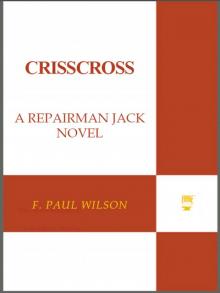 Crisscross
Crisscross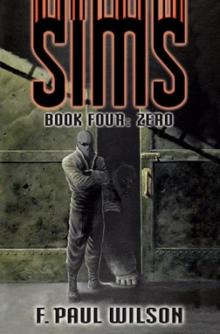 Ground Zero
Ground Zero Short Stories
Short Stories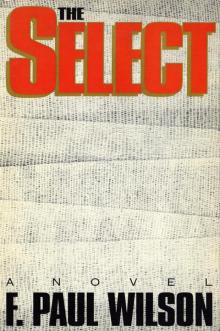 The Select
The Select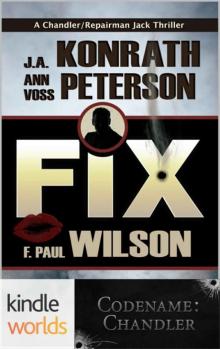 Codename
Codename Bloodline
Bloodline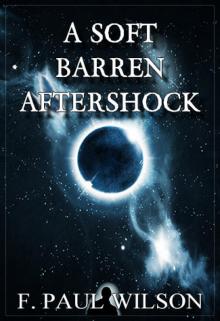 A Soft Barren Aftershock
A Soft Barren Aftershock The Tomb
The Tomb The Complete LaNague
The Complete LaNague The Tery
The Tery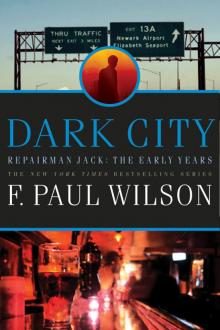 Dark City
Dark City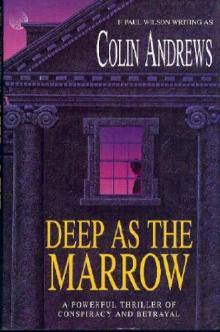 Deep as the Marrow
Deep as the Marrow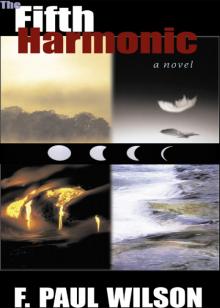 The Fifth Harmonic
The Fifth Harmonic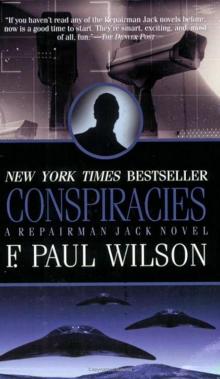 Conspiracies
Conspiracies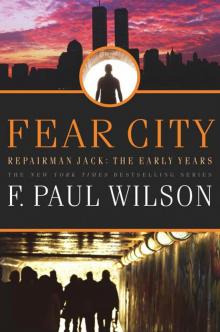 Fear City
Fear City Wheels Within Wheels
Wheels Within Wheels Wayward Pines
Wayward Pines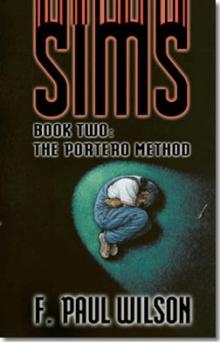 The Portero Method
The Portero Method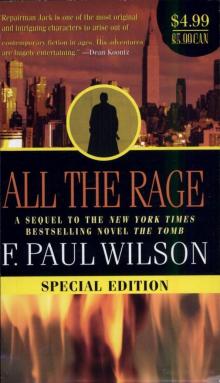 All the Rage
All the Rage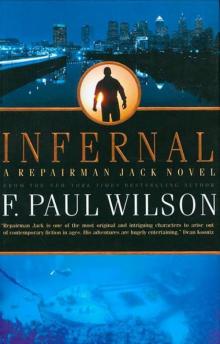 Infernal
Infernal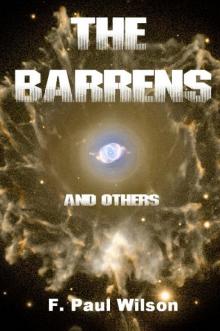 The Barrens & Others
The Barrens & Others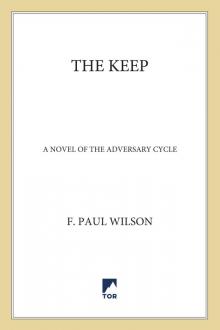 The Keep
The Keep Quick Fixes: Tales of Repairman Jack
Quick Fixes: Tales of Repairman Jack Virgin
Virgin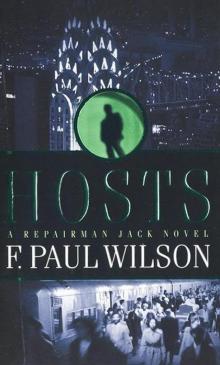 Hosts
Hosts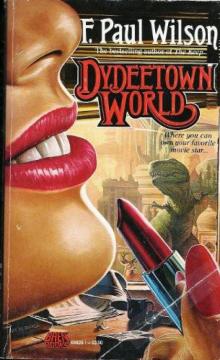 Dydeetown World
Dydeetown World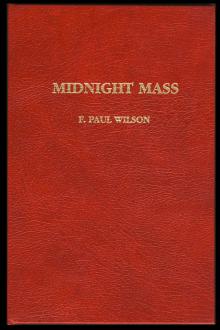 Midnight Mass
Midnight Mass Black Wind
Black Wind The Christmas Thingy
The Christmas Thingy The Last Rakosh
The Last Rakosh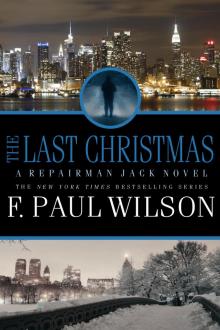 The Last Christmas: A Repairman Jack Novel
The Last Christmas: A Repairman Jack Novel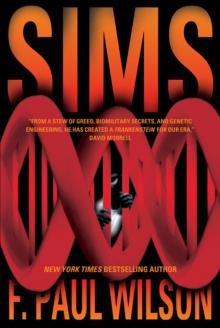 SIMS
SIMS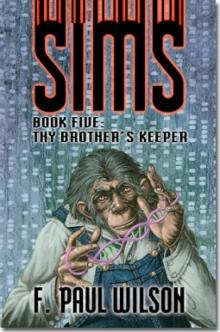 Thy Brother's Keeper
Thy Brother's Keeper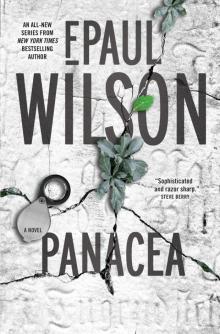 Panacea
Panacea The Touch
The Touch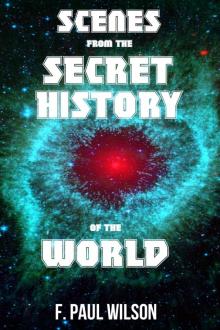 Scenes from the Secret History
Scenes from the Secret History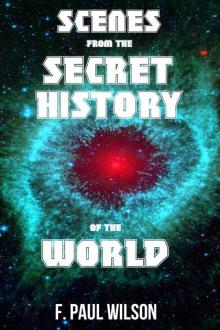 Scenes From the Secret History (The Secret History of the World)
Scenes From the Secret History (The Secret History of the World)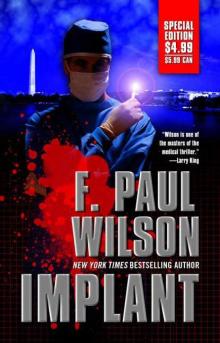 Implant
Implant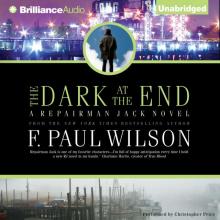 The Dark at the End
The Dark at the End Fatal Error
Fatal Error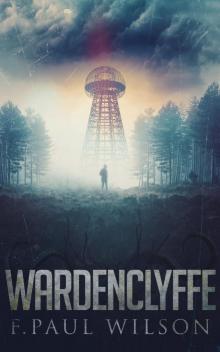 Wardenclyffe
Wardenclyffe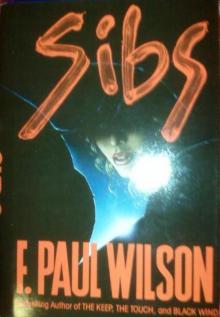 Sibs
Sibs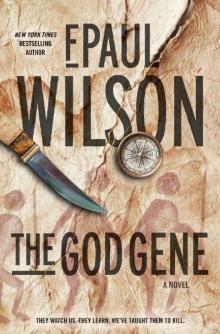 The God Gene
The God Gene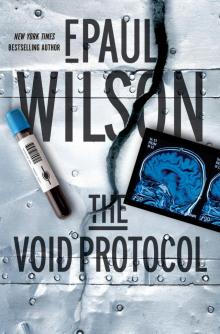 The Void Protocol
The Void Protocol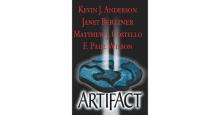 Artifact
Artifact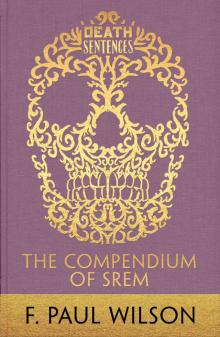 The Compendium of Srem
The Compendium of Srem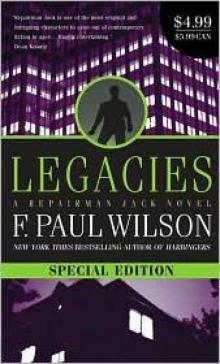 Legacies
Legacies Reprisal
Reprisal Jack: Secret Vengeance
Jack: Secret Vengeance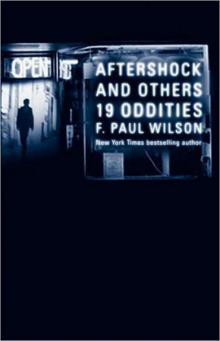 Aftershock & Others: 19 Oddities
Aftershock & Others: 19 Oddities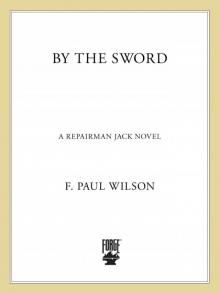 By the Sword
By the Sword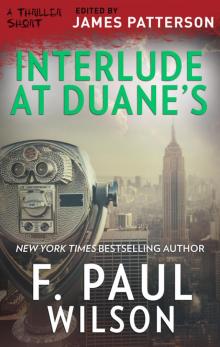 Interlude at Duane's (Thriller: Stories to Keep You Up All Night)
Interlude at Duane's (Thriller: Stories to Keep You Up All Night)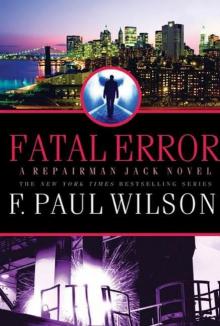 Fatal Error rj-13
Fatal Error rj-13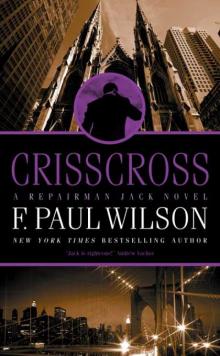 Crisscross rj-8
Crisscross rj-8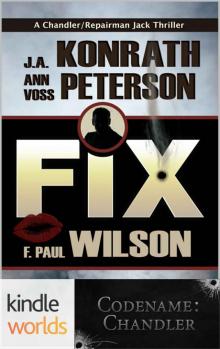 Codename: Chandler: Fix (Kindle Worlds Novella)
Codename: Chandler: Fix (Kindle Worlds Novella)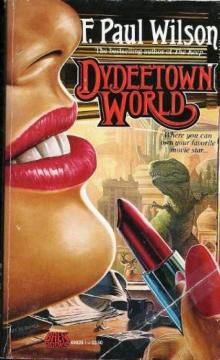 Dydeetown World lf-4
Dydeetown World lf-4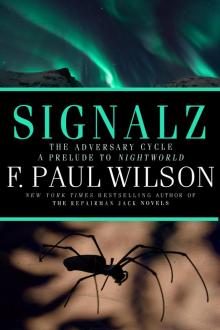 Signalz
Signalz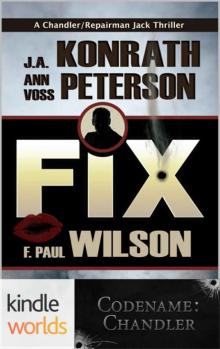 Codename_Chandler_Fix
Codename_Chandler_Fix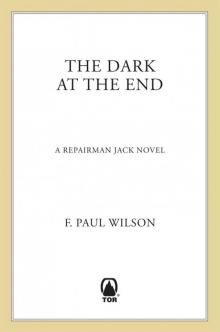 The Dark at the End (Repairman Jack)
The Dark at the End (Repairman Jack)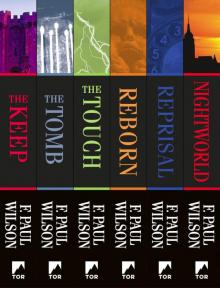 The Complete Adversary Cycle: The Keep, the Tomb, the Touch, Reborn, Reprisal, Nightworld (Adversary Cycle/Repairman Jack)
The Complete Adversary Cycle: The Keep, the Tomb, the Touch, Reborn, Reprisal, Nightworld (Adversary Cycle/Repairman Jack)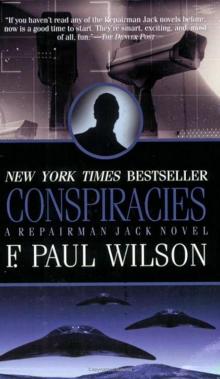 Repairman Jack 03 - Conspiracies
Repairman Jack 03 - Conspiracies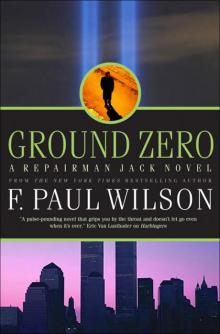 Ground Zero rj-13
Ground Zero rj-13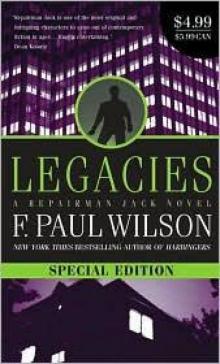 Repairman Jack 02 - Legacies
Repairman Jack 02 - Legacies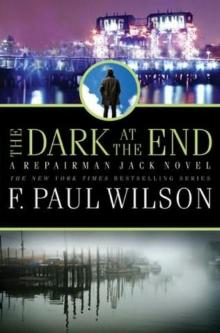 The Dark at the End rj-15
The Dark at the End rj-15![Repairman Jack [02]-Legacies Read online](http://i1.bookreadfree.com/i/03/21/repairman_jack_02-legacies_preview.jpg) Repairman Jack [02]-Legacies
Repairman Jack [02]-Legacies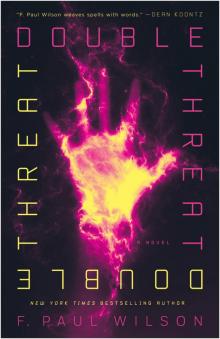 Double Threat
Double Threat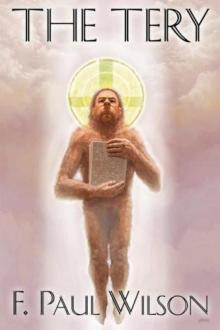 The Tery lf-5
The Tery lf-5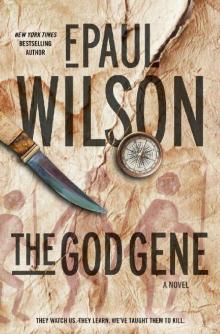 The God Gene: A Novel
The God Gene: A Novel Wayward Pines: The Widow Lindley (Kindle Worlds Novella)
Wayward Pines: The Widow Lindley (Kindle Worlds Novella)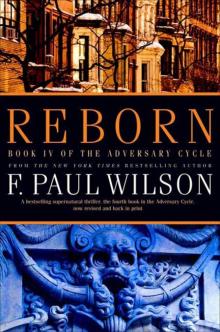 Reborn ac-4
Reborn ac-4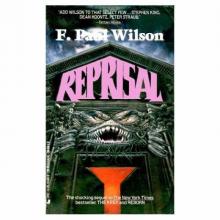 Reprisal ac-5
Reprisal ac-5 New Title 1
New Title 1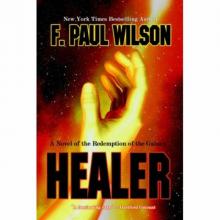 Healer lf-3
Healer lf-3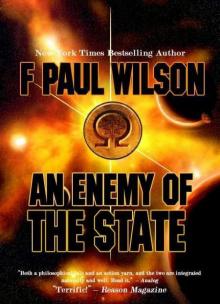 An Enemy of the State lf-1
An Enemy of the State lf-1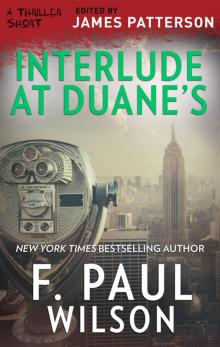 Interlude at Duane's
Interlude at Duane's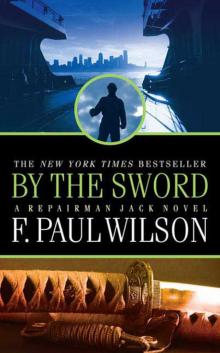 By the Sword rj-12
By the Sword rj-12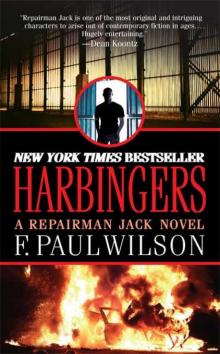 Hardbingers rj-10
Hardbingers rj-10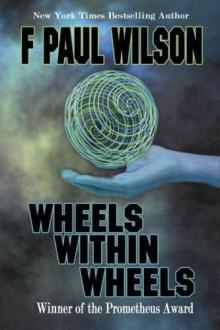 Wheels Within Wheels lf-2
Wheels Within Wheels lf-2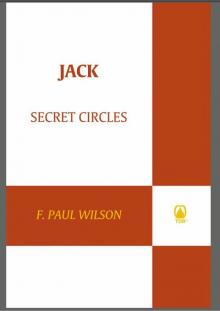 Jack: Secret Circles
Jack: Secret Circles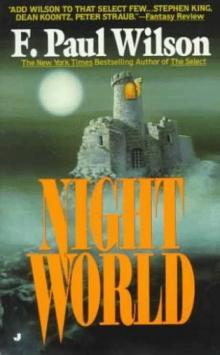 Nightworld ac-6
Nightworld ac-6 Quick Fixes - tales of Repairman Jack
Quick Fixes - tales of Repairman Jack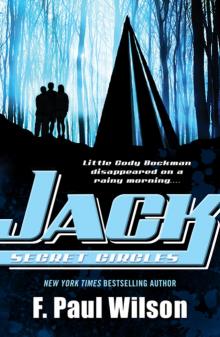 Secret Circles yrj-2
Secret Circles yrj-2 Jack: Secret Histories
Jack: Secret Histories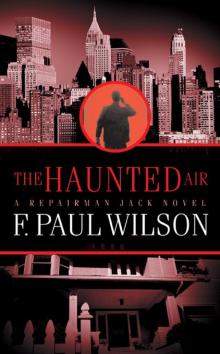 Haunted Air rj-6
Haunted Air rj-6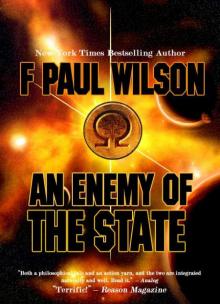 An Enemy of the State - a novel of the LaNague Federation (The LaNague Federation Series)
An Enemy of the State - a novel of the LaNague Federation (The LaNague Federation Series)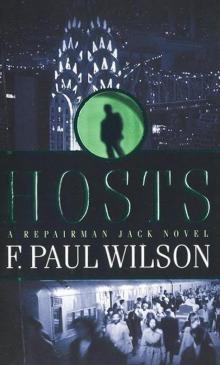 Repairman Jack 05 - Hosts
Repairman Jack 05 - Hosts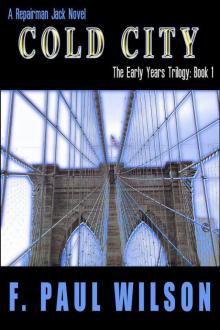 Cold City (Repairman Jack - the Early Years Trilogy)
Cold City (Repairman Jack - the Early Years Trilogy)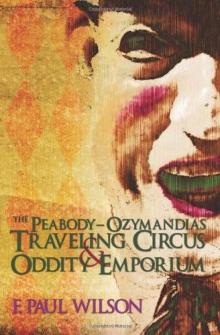 The Peabody-Ozymandias Traveling Circus & Oddity Emporium
The Peabody-Ozymandias Traveling Circus & Oddity Emporium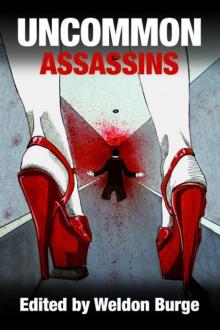 Uncommon Assassins
Uncommon Assassins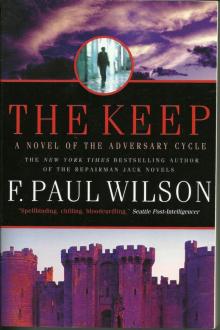 Adversary Cycle 01 - The Keep
Adversary Cycle 01 - The Keep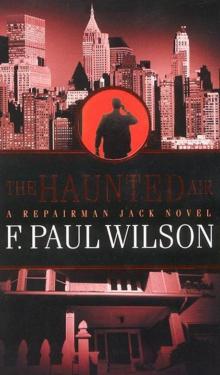 Repairman Jack 06 - The Haunted Air
Repairman Jack 06 - The Haunted Air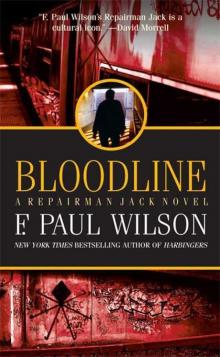 Bloodline rj-11
Bloodline rj-11 Ultimate Supernatural Horror Box Set
Ultimate Supernatural Horror Box Set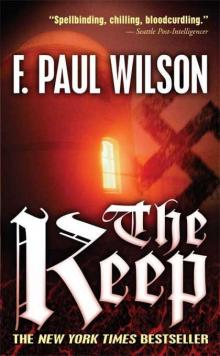 The Keep ac-1
The Keep ac-1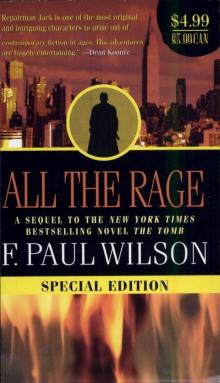 Repairman Jack 04 - All the Rage
Repairman Jack 04 - All the Rage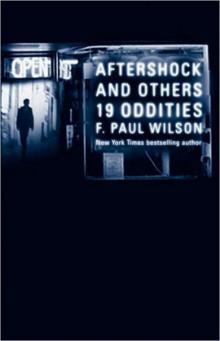 Aftershock & Others
Aftershock & Others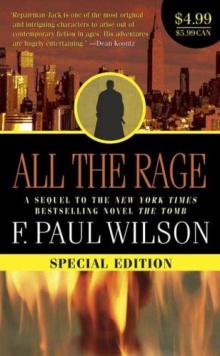 All the Rage rj-4
All the Rage rj-4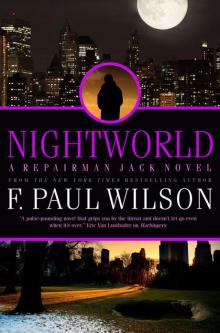 Nightworld (Adversary Cycle/Repairman Jack)
Nightworld (Adversary Cycle/Repairman Jack)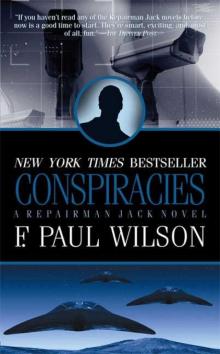 Conspircaies rj-3
Conspircaies rj-3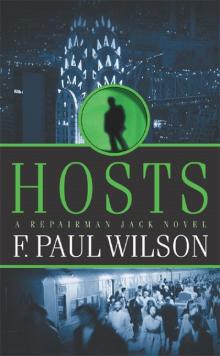 Hosts rj-5
Hosts rj-5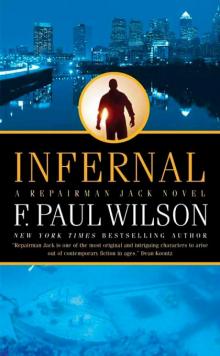 Infernal rj-9
Infernal rj-9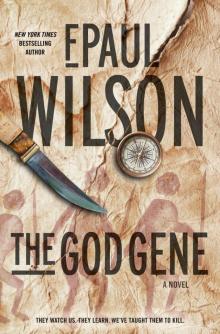 The God Gene: A Novel (The ICE Sequence)
The God Gene: A Novel (The ICE Sequence)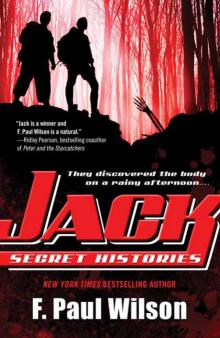 Secret Histories yrj-1
Secret Histories yrj-1